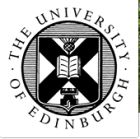The World and Life are one. Physiological life is of course not "Life". And neither is psychological life. Life is the world.
Ethics does not treat of the world. Ethics must be a condition of the world, like logic.
Ethics and Aesthetics are one.
Ludwig Wittgenstein, in Journal entry (24 July 1916), p. 77e, Notebooks 1914-1916, as translated by Gertrude Elizabeth Margaret Anscombe, first edition (1961), Second edition (1984)

